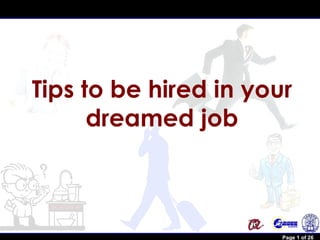Tips to get a job
- 1. Tips to be hired in your dreamed job Robert Brunet Page 1 of 26
- 2. I am the best for this job and I will show it Robert Brunet Page 2 of 26
- 3. Case study Hello! I am Mickael Ozgen the Project Director of AEGEE- Europe. I am looking for a candidate to be the new project manager of a European project. The position will be for one of you. Robert Brunet Page 3 of 26
- 4. Job offer Requeriments We are looking for motivated and commercially minded individuals with the ambition to become successful business professionals in a global organization. Your profile should include: - Bachelor degree or Master degree. - Fluent English (obligatory). - German and french (optional). - Excellent communications and inter-personal skills with a desire to work in a people-oriented environment. Robert Brunet Page 4 of 26
- 5. Where is the problem ??? 1 job offer = 1000 people applies Robert Brunet Page 5 of 26
- 6. Recruitment filter procedure People with not degree 1st Filter People with not English 1000 Computer Algorithm 75% People with no experien ... 250 2nd Filter Phone Interview 75% 3rd Filter 60 HR Interview 50% 4th Filter 30 Technical Interview 80% 6 5th Filter 1 Robert Brunet Page 6 of 26
- 7. Be ready to pass the filter and get a job Robert Brunet Page 7 of 26
- 8. Steps to get a job Yes Yes Yes 4th Filter 1st Filter 2nd Filter 2nd Filter Yes Robert Brunet Page 8 of 26
- 9. Prepare your Stuff Before · Paper Curriculum Vitae (CV) · Paper Cover Letter · Paper Recommended Letter Now · Electronic Curriculum Vitae (CV) · Electronic Cover Letter · Electronic Recommended Letter · LinkedIn User · Video CV Robert Brunet Page 9 of 26
- 10. Curriculum Vitae (CV) Info http://www.modelocurriculum.net/ We recommend Europass http://europass.cedefop.europa.eu/es/home Robert Brunet Page 10 of 26
- 11. Robert Brunet Page 11 of 26
- 12. Robert Brunet Page 12 of 26
- 13. Robert Brunet Page 13 of 26
- 14. Robert Brunet Page 14 of 26
- 15. Example Curriculum Vitae (CV) Robert Brunet Page 15 of 26
- 16. Cover letter Also known as motivation letter. It is a way of introducing yourself as a potential employer for a the desired position. Robert Brunet Page 16 of 26
- 17. Recommendation letter âĒLetters of recommendation are typically related to employment, admissions to institutions of higher education or scholarship eligibility. âĒThe recommendation letter can be done by some of your professors or bosses. âĒIn this letter the writer assesses the qualities, characteristics, and capabilities of the person being recommended in terms of that individualâs ability to perform a particular task or function. Robert Brunet Page 17 of 26
- 18. LinkedIn User âĒLinkedIn is a business-related social networking site. âĒ LinkedIn with 135 million user is one of the best ways to be connected with companies and find a job. www.linedin.com Robert Brunet Page 18 of 26
- 19. How to make a LinkedIn Profile? 1. Go to www.linedin.com 2. Join LinkedIn Today 3. Create your profile Name 4 Headline Location & Industry Summary Experience Honors and Awards Publications 5 Skills & Expertise Education Recommendations Additinal Information Personal Information âĒ Add Contacts âĒ Add Groups Robert Brunet Page 19 of 26
- 20. Video CV Robert Brunet Page 20 of 26
- 21. PowerPoint CV Robert Brunet Page 21 of 26
- 22. They consider that I am potential candidateâĶ They will interview meâĶ Robert Brunet Page 22 of 26
- 23. How to practise a interview 3 types of interviews · Telephone Interviews · HR Interviews · Technical Interviews Robert Brunet Page 23 of 26
- 24. Telephone Interview âĒ They are real interviews held over the phone rather than face-to-face. âĒ You will usually be interviewed by a member of the graduate recruitment or HR team. âĒ A telephone interview will usually be given to candidates who have passed the online application and/or psychometric teststage of the graduate recruitment process and is used to sift out applicants to be invited to a face- to-face interview or assessment centre. Tips âĒKeep a copy of your application and information on the company handy, plus a pen and notepad to take notes. âĒBefore the call, make a list of your USP's (unique selling points): âĒDon't just read out your notes as this will sound stilted. âĒItâs useful to have a glass of water to hand during a phone interview âĒOver the phone you have to show this by the occasional "OK", "uh-huh", "I see", "I understand", "yes" or similar interjections. âĒListen very carefully to the interviewer and try to answer with a lively tone of voice. Speak clearly and not too fast. âĒImmediately after the interview, write down the questions you were asked and any ways in which you could have improved your responses. Robert Brunet Page 24 of 26
- 25. The 10 most common questions 1. Why do you want this job? 3. Have you got any questions? 5. Describe a situation in which you lead a team. 7. Describe a situation where you worked in a team 9. What do you expect to be doing in 5 years time? 11.What are your weaknesses? 13.Who else have you applied to/got interviews with? 15.Why did you choose your university and what factors influenced your choice 17.What are your strengths? 19. What has been your greatest achievement? Robert Brunet Page 25 of 26
- 26. I get a job I will have to work hardâĶ Robert Brunet Page 26 of 26


























